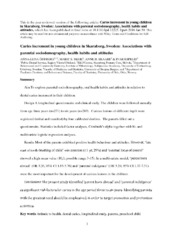Caries increment in young children in Skaraborg, Sweden: associations with parental sociodemography, health habits, and attitudes
Peer reviewed, Journal article
Accepted version
Permanent lenke
https://hdl.handle.net/1956/19284Utgivelsesdato
2017-01Metadata
Vis full innførselSamlinger
Originalversjon
https://doi.org/10.1111/ipd.12225Sammendrag
Aim: To explore parental sociodemography, oral health habits, and attitudes in relation to dental caries increment in their children. Design: A longitudinal questionnaire and clinical study. The children were followed annually from age 3 years (n = 271) to 6 years (n = 243). Carious lesions of different depth were registered (initial and manifest) by four calibrated dentists. The parents filled out a questionnaire. Statistics included factor analyses, Cronbach's alpha together with bivariate and multivariate logistic regression analyses. Results: Most of the parents exhibited positive health behaviour and attitudes. ‘Late start of toothbrushing of child’ was, however, common (≥1 year; 29%) and ‘external locus of control’ showed a high mean value (10,1; possible range 3–15). In a multivariate model, ‘parent born abroad’ (OR 3.26, 95% CI 1.85–5.76) and ‘parental indulgence’ (OR 3.20, 95% CI 1.37–7.51) were the most important for the development of carious lesions in the children. Conclusions: This study identified ‘parent born abroad’ and ‘parental indulgence’ as significant risk factors for caries in the age period 3 to 6 years. Identifying parents with the greatest need should be emphasized, in order to target promotion and prevention activities.
